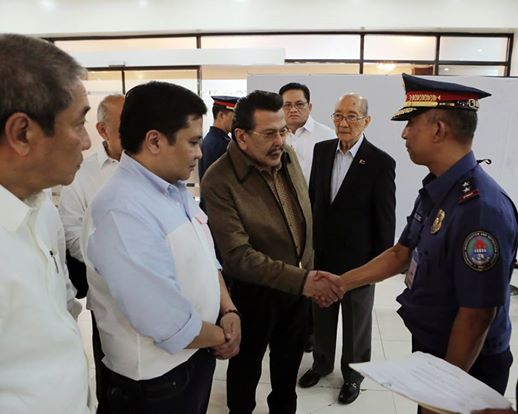
MANILA — The Supreme Court (SC ) en banc dismissed on Tuesday the petition for certiorari with application for temporary restraining order (TRO) filed by Senator Jose “Jinggoy” Estrada to restrain the Sandiganbayan from admitting into evidence the purported disbursement report of JLN Corporation as well as the testimony thereon of pork barrel scam whistle-blower Benhur Luy.
JLN Corporation is owned by businesswoman Janet Lim Napoles, the alleged “brains” behind the PhP10-billion pork barrel and the PhP900-million Malampaya Fund scams.
In a press conference, SC Public Information Office (PIO) Chief and Spokesman Atty. Theodore O. Te said, “The Court denied the petitioner’s request for TRO but required respondents to comment on the petition within 10 days from notice.”
In his 27-page petition for certiorari and prohibition, Estrada questioned the Oct. 31, 2014 minute resolution and Dec. 1, 2014 resolution of the Sandiganbayan’s Fifth Division denying his request to suppress and exclude the purported Daily JLN Corporation Cash/Check Disbursement Reports and the testimony of Luy regarding the said documents.
Estrada asked the SC to order the exclusion of the questioned documents and Luy’s testimony from the records of his criminal case.
He also asked the SC to issue a temporary restraining order (TRO) that will enjoin the Sandiganbayan from admitting the said documents into evidence.
Estrada is facing plunder and graft charges before the Sandiganbayan in connection with the allegations that he is involved in the supposed misuse of Priority Development Assistance Fund (PDAF).
The said pieces of evidence were presented by the prosecution in the proceedings on Estrada’s petition for bail.
The purported disbursement reports of the JLN Corporation are contained in the external hard drive of Luy which was turned over to the National Bureau of Investigation-Cybercrime Investigation Unit.
In his petition, Estrada accused the Sandiganbayan of committing grave abuse of discretion and violating his constitutional right against unreasonable searches and seizure.
“Senator Estrada invokes the commitment of the Constitution against unlimited arbitrary State power, as well as against any act in violation of the Bill of Rights. And so, Senator Estrada comes before this Honorable Supreme Court seeking its protection, this time from the actions of the Honorable Sandiganbayan in violation of his Constitutional right against unreasonable searches and seizure, and made without or in excess of jurisdiction or with grave abuse of discretion amounting to lack or excess of jurisdiction,” the petition said.
The Estrada camp also insisted that the questioned Disbursement Reports are not the property of Luy.
“As an employee of JLN Corporation, Mr. Luy does not own purported Disbursement Reports even if he supposedly encoded such electronic files, as intellectual property produced by an employee contemplated by such contract of employment belongs to the employer and not to the employee,” Estrada argued.
Estrada also argued that the “unauthorized access, collection and disclosure of the electronic files constituting the disbursement reports constitute a violation of Republic Act No. 10175 [Cybercrime Prevention Act of 2012].”
Under Section 12 of R.A. No. 10175, “data to be collected or seized or disclosed will require a court warrant.”
Hence, Estrada said that since the disclosure of Luy of the disbursement reports was not done by virtue of a court warrant, his testimony violates the Cybercrime Law.
He added that as a consequence for the failure to obtain a warrant for the disclosure of the disbursement reports as contained in an electronic data, the external hard drive and its contents are inadmissible in any proceedings as stated under Section 18 of R.A. No. 10175.